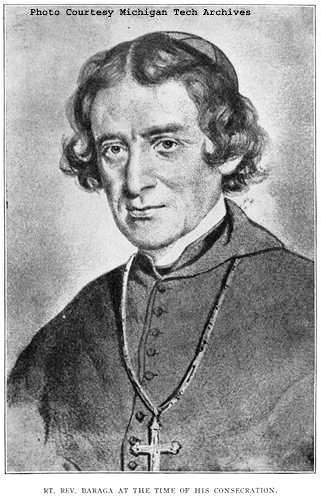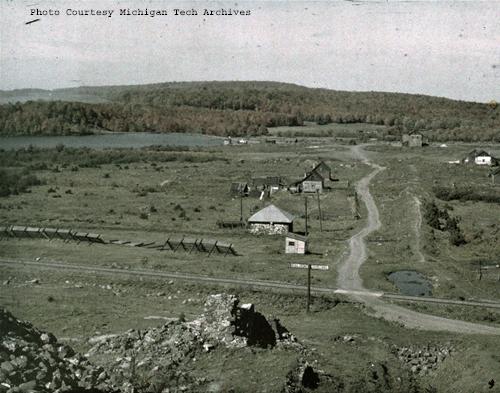An international border, an industrious bishop, and the Isle Royale Mining Company are the featured topics of the Summer Archival Speaker Series from the Michigan Tech Archives. The series gets underway Thursday, June 18th at 7 p.m., in the Archives Reading Room at the Van Pelt and Opie Library with a talk by visiting scholar Peter Krats.
Differently Similar: Comparing the Keweenaw and Nickel Belts is an examination of the resource-rich industrial frontiers of the Keweenaw Peninsula, Michigan and the Sudbury Basin, Ontario. Krats, an assistant professor at the University of Western Ontario will talk about the impact of the Canadian-American border on these two northern mining regions. In Michigan, rich copper reserves were exploited by large companies intent on making the most of natural resources far from the center. Just a few hundred miles away but across an international border, the world’s greatest nickel reserves saw even larger firms emerge and invest in a metal-rich hinterland.
[The industrial landscape of the Copper Country shares many similarities with Sudbury’s Nickel Belt. This image of Calumet can be found at the Keweenaw Digital Archives at http://digarch.lib.mtu.edu/showbib.aspx?bib_id=594938#]
But the Keweenaw and the Sudbury Basin arose, stabilized and matured in substantially different ways. Krats will talk about variations in company town formation, ethnicity, and immigration, and illustrate how contrasts between the American belief in “liberty” and Canadian confidence in “good government” affected both regions. The consequences of these parallels and variations are apparent even in the present-day settings. The related concepts of similarity and difference are part of a spectrum of the historical experience of North America, and Krats questions and reveal the linkages between two nations sharing a border and more.
Krats is a visiting scholar at the Michigan Tech Archives this summer. His research is funded in part by a Michigan Tech Archives Travel Grant, which enables scholars to travel to the Archives to study its collections in greater depth. The Travel Grant is generously supported by the Friends of the Van Pelt Library.

[Frederic Baraga is considered the first Slovene to call the Keweenaw home. Click on the link http://digarch.lib.mtu.edu/showbib.aspx?bib_id=598948# to access this image.]
Another travel grant recipient, James Seelye, comes to the Archives in June to continue his research into the impact of Slovenes in the Copper Country. He will give a public talk about one of the area’s most notable Slovenes, Bishop Baraga. As a missionary to the Lake Superior Chippewa, Frederic Baraga spent nearly forty years of his life trying to convert Native Americans Indians to Catholicism. In the process, he left behind a rich written record that includes theology, missionary activities, travels, and Native Americans. James Seelye, a doctoral candidate at the University of Toledo, and recipient of a Michigan Tech Archives Travel Grant, takes a deeper look at the man behind the myth. He explores who Baraga truly was, and in the process, discover why Baraga means so many different things to so many different people, even a candidate for sainthood in the Roman Catholic Church. Seelye’s presentation, The Snowshoe Priest Revisited: A Reappraisal of Frederic Baraga, is scheduled for Tuesday June 30th, at 7 p.m., in Room 139 of Fisher Hall.
In July, popular local historian Bill Haller will give an illustrated talk on the History of the Isle Royale Mine. Following unsuccessful attempts at mining in Copper Harbor and on the island of Isle Royale, the Isle Royale Mining Company relocated south of Houghton in 1852. Following unsuccessful attempts at mining in Copper Harbor and on the island of Isle Royale, the Isle Royale Mining Company relocated south of Houghton in 1852. It was one of many small mines working the “South Portage Range,” including the Portage, Dodge, and Huron mines. Some of these companies also developed communities around their mines, including the present towns of Dodgeville and Hurontown. From 1909 until 1946, the properties operated as a subsidiary of the famed Calumet & Hecla Company.

[The Isle Royale Mining Company operated between present day Dodgeville and Hurontown. http://digarch.lib.mtu.edu/showbib.aspx?bib_id=610462#]
The presentation will provide an overview of the evolution of this important mining area, including photographs and maps showing the different mine locations, industrial buildings, and underground workings. Although few significant structures remain from the Isle Royale Mine, many of the operation’s key sites lay adjacent to major highways and are passed unknowingly by local residents every day. Haller will talk about his research on July 21st, a Tuesday, at 7 p.m., in Room 641 of the Dow Building on the Michigan Tech campus.
Michigan Tech’s “Archival Speakers Series” highlights current research utilizing the Archives’ collections. The Michigan Tech Archives & Copper Country Historical Collections, a department of the J. Robert Van Pelt and Opie Library, hosts a wide variety of researchers and research topics from genealogical investigations to book and magazine publications that engage students, staff, and faculty, local citizens, out of town visitors, and off-campus researchers. The presentations are free and open to the public.
For further information contact the MTU Archives at (906) 487-2505 or via e-mail at copper@mtu.edu, or visit the website at www.lib.mtu.edu/archives. The Archives reading room is located on the ground floor of the J. Robert Van Pelt Library, in the heart of the Michigan Tech campus.

Friends come and go, but relatives tend to accumulate.